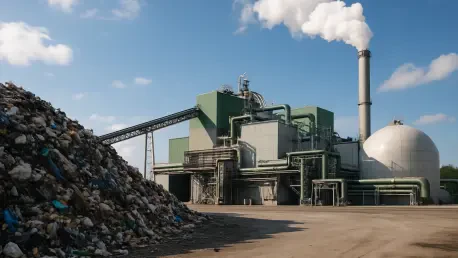In the heart of the Pacific, the Solomon Islands faces an escalating environmental crisis as mountains of waste accumulate daily, threatening public health, marine ecosystems, and the very livelihoods of its people, while urban centers like Honiara generate staggering amounts of refuse, making the challenge of managing this deluge more urgent than ever. Amidst this pressing issue, a beacon of hope emerges through the efforts of an inspired individual who, after gaining international exposure, is determined to transform waste into a resource. Supported by global initiatives and armed with newfound knowledge, this advocate is pushing for innovative technologies to address a problem that affects not just the environment but the future of entire communities. The journey from overcrowded landfills to sustainable solutions is fraught with obstacles, yet it also holds immense potential for change.
Addressing a Growing Crisis
The Scale of the Waste Challenge
The waste management situation in the Solomon Islands paints a grim picture, particularly in the capital, Honiara, where residents produce between 80 and 100 tons of garbage every single day. Much of this waste ends up in overburdened dumpsites like Ranadi Landfill, leading to severe pollution and health hazards for nearby communities. The environmental impact is compounded by greenhouse gas emissions from decomposing organic matter, which makes up over 70% of the waste stream. Additionally, plastic waste, accounting for 10 to 15% of urban household refuse, poses a dire threat to marine ecosystems, coral reefs, and vital industries such as fisheries and tourism. These interconnected issues highlight the urgent need for systemic change in how waste is handled, as the consequences of inaction ripple across environmental, economic, and social spheres, endangering food security and the natural beauty that defines the region.
Health and Environmental Consequences
Beyond the sheer volume of waste, the repercussions of inadequate disposal systems in the Solomon Islands are deeply concerning for public health and environmental sustainability. Improperly managed dumpsites become breeding grounds for disease, exposing residents to risks that could be mitigated with better infrastructure. The leakage of pollutants into soil and water sources further exacerbates the problem, threatening the delicate balance of local ecosystems. Marine life, already under stress from plastic pollution, suffers as debris chokes waterways and damages habitats critical to biodiversity. This environmental degradation also undermines tourism, a key economic driver, as visitors are deterred by visible pollution. Addressing these intertwined challenges requires not only immediate action to curb waste accumulation but also long-term strategies to protect both the population and the pristine natural resources that are integral to the nation’s identity and economy.
Pathways to Sustainable Solutions
Innovating with Waste-to-Energy Technologies
One promising avenue for tackling the waste crisis in the Solomon Islands lies in the adoption of waste-to-energy technologies, which can transform refuse into a valuable resource. Methods such as pyrolysis, gasification, and biological conversion offer viable ways to process the substantial organic waste that dominates the region’s trash output. These technologies not only reduce the volume of material sent to landfills but also generate clean energy, providing a dual benefit of waste reduction and power production. Inspired by international best practices, advocates are championing pilot projects to demonstrate the feasibility of these systems in a local context. By converting waste into energy, there is potential to alleviate pressure on existing disposal sites while creating new economic opportunities through job creation in emerging sectors, thereby fostering a more sustainable approach to resource management.
Building Capacity and Collaboration
Equally critical to technological innovation is the need to build local expertise and foster collaborative efforts to ensure lasting change in waste management practices. The establishment of an independent body to oversee waste initiatives could unite government agencies, private businesses, and community groups in setting standards and sharing knowledge. Such an entity would help address gaps in technical skills and promote public-private partnerships essential for scaling up solutions. Drawing from global models, there is a push to integrate waste minimization strategies and enforce stronger policies as outlined in national frameworks. Over the next few years, from now until 2027, the focus will be on training programs and knowledge exchange to empower local stakeholders. International support, coupled with the dedication of returning alumni, has already shown promise in sparking momentum for resilient infrastructure and sustainable communities, reflecting a shared commitment to turning challenges into opportunities.
Reflecting on Past Efforts and Future Hopes
Looking back, the dedication of individuals who returned with fresh perspectives after international training stood as a catalyst for change in the Solomon Islands’ waste management landscape. Their advocacy for innovative approaches and institutional reforms laid a vital foundation for progress. The emphasis on transforming waste into energy through advanced technologies was matched by a resolve to strengthen local capacity and partnerships. As past efforts highlighted the scale of environmental and health challenges, they also illuminated pathways forward. Moving into the future, the focus must shift toward scaling up pilot initiatives, securing funding for infrastructure, and engaging communities in waste reduction practices. By building on these early strides, there is an opportunity to create a model of sustainability that not only addresses immediate needs but also safeguards the environment for generations to come, ensuring a cleaner, healthier Pacific nation.









